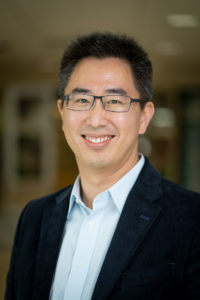Originally appeared in Source. Article by Peyton Daily
Best Teacher Award winner KuoRay Mao helps students become problem solvers for real world issues
Great teaching embodies much more than the transmission of knowledge; it is characterized by a willingness to dedicate the classroom to the growth of the students. This commitment to students is just one of the qualities that has earned Assistant Professor of Sociology KuoRay Mao the recognition of Best Teacher Award winner for 2020.
From his international upbringing to his appreciation of differences in origin and perspective, Mao has earned his students’ admiration and respect. His own winding educational path and experience as a minority student have made Mao adamant about encouraging his students to be the best versions of themselves. The support Mao extends to his students has continued through the transition to online teaching. He is still focused on students’ academic growth and well-being outside the classroom.
Growing up abroad
Until the age of 17, Mao lived in Taiwan. His educational experience centered around mastering fundamentals, studying many more subjects than the typical American student. As a high school student, his school day began at 7:30 in the morning and ended at 6:30 at night. The intensity of his early education taught him how to persevere in difficult circumstances. At age 17, Mao had the chance to pursue his education in the U.S. and in a matter of weeks he moved there to finish his senior year of high school.
During his childhood, Mao witnessed the aftermath of the Chinese Civil War and Taiwan’s subsequent democratization. This experience impacted Mao both immediately and long term, sparking a curiosity for social and societal relationships. This curiosity led Mao to pursue sociology for his undergraduate studies in California as well as his master’s and doctorate degrees at the University of Kansas, Lawrence.
Trials of identity
“My entire life, I have been a minority. I know the feeling of being marginalized,” said Mao, whose parents were from China, which labeled him and his family as “mainlanders” because he and his family did not speak Taiwanese.
In the U.S., Mao faced similar challenges. The new labels targeted his Asian heritage, appearance, and cultural norms. “I did not have the chance to speak English until I moved to the United States,” said Mao. Mao faced rampant hostility as a result of his immigrant identity in the beginning of his acculturation experience in the U.S.
This difference in treatment lasted through his college years and into his teaching career. Even after earning his PhD in sociology, some students still questioned his ability to teach competently. “Some students who I had before CSU automatically presumed that because I do not have an anglicized name, I must not be qualified or that I would have a heavy accent that would impede their learning,” said Mao.
Paying it forward

“Dr. Mao is an exceptional teacher because of his enthusiasm towards the dynamic subject matter in his courses, his radical care and support of all his students, and his genuine belief that he learns from his students every single day.”
– Isabel Mintz-Schuffman (’19)
Despite the challenges Mao faced, he persevered. One of Mao’s undergraduate professors, also a minority, told him he should “not be constrained by the naysayers, stereotypes, and discriminatory practices of slow violence.”
This encouragement guided Mao through each micro-aggression or doubt he faced. Mao chose to pursue academia so that he, too, could be an impactful educator, inspiring students of all backgrounds.


Student-centered teaching practices
For Mao, being a teacher means holding his students to high academic standards while challenging them to be better citizens. Mao believes a good teacher should “disseminate knowledge, impart perspectives, and inspire students to be contributors to society.” He practices this in his own classroom by implementing principles that foster these values.
During the first class of each semester, Mao sets the expectation that all perspectives are welcome. He encourages his students to build a dialogue across differences and to consider different points of view. Mao firmly believes in leading by example, sharing his own anecdotes during lectures. Once he opens up, students feel more comfortable sharing their own experiences and perspectives.
Another teaching principle Mao espouses is a belief in co-created knowledge. “Sociology is really for me about understanding the world and dissecting the structure through approaches built on lived experiences,” said Mao.
Mao believes every student’s experience contributes to a better understanding of the subject. He learns from the diverse perspectives his students offer and challenges students to consider their points of view in a broader context. This approach helps students build critical thinking skills, especially during challenging discussions.
Each semester, Mao modifies his curriculum to respond to shifts in student interests. He uses contemporary examples so students can see how class concepts apply to relevant issues. In applying these concepts, Mao motivates his students to use a problem-solving mindset and promotes solution-based thinking. He believes this approach to issues will prepare his students to be responsible and active citizens. Preparing his students to succeed both in and out of the classroom is Mao’s goal.
“I believe in my students and I care about their growth,” said Mao.

Teaching excellence
Mao proves again and again that he is a great teacher in any context. Prioritizing students’ growth and challenging them to think ethically and inclusively distinguish him as a professor. Mao aims to welcome and encourage students from all backgrounds to voice their experiences in his classroom.
“I have reaffirmed that in addition to being professionals we need to be good leaders because we are responsible for our team members and being the rock that students can count on,” said Mao.
While the original award ceremony will not be held this academic year due to COVID-19, Mao will still be honored formally next year. The BTA ceremony has been rescheduled for the evening of March 24, 2021 at the LSC Theatre. Registration will open in January 2021.